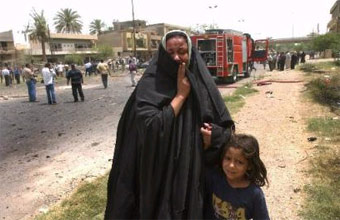|
Anti-American sentiment grows in Iraq holy city
(Agencies)
Updated: 2004-06-01 13:01
Thousands of leaflets urging Najaf's residents to hand in their weapons litter the street near a U.S. tank parked by the governor's office.
Almost all of them have been ripped up.
"People read the leaflet and get annoyed and then deliberately tear it," said Ahmed Mussawi, a tea boy standing opposite the fortified offices, where flyers not caught on the razor wire flutter in the air.

An Iraqi woman and her daughter walk out into the street in front of their house to view the scene of a car bomb explosion in Baghdad, Iraq Monday May 31, 2004. |
U.S. troops have been able to move more freely in the holy city's main streets since radical cleric Moqtada al-Sadr's truce offer last week led to a reduction in violence after almost two months of clashes that killed hundreds of Iraqis.
Fighting has taken its toll on the once thriving city, scaring away hundreds of thousands of Shi'ite pilgrims from nearby Iran and elsewhere who flocked to its shrines, the most sacred in Shia Islam.
Many residents blame Sadr, who has taken sanctuary in the shrines, for provoking a futile confrontation between his poorly trained Mehdi army militia and superior U.S. firepower.
But even opponents of his violent tactics say popular hostility toward the U.S. occupiers is deepening.
"We are getting hurt from both sides but the Americans are foreign occupiers and the Mehdi Army remain our people," said Ali Ghuraifi, whose house was damaged by a stray mortar round fired by the Shi'ite rebels.
As a U.S. Marine walks to his tank carrying a watermelon in the sweltering summer heat, Haider Saleh, 28, an engineer, openly curses the soldier.
"It's sinful to offer them anything. They are Jews," said Saleh, who lives near the governor's office.
In neighborhoods where the rebels are now out of sight, U.S. patrols make bystanders nervous.
"This is the freedom they promised us," said one resident, Jaber Kazem, 52, a merchant, pointing to the city square where charred lampposts, shell-damaged hotels and shattered glass bear witness to the recent fighting.
LOSS OF FAITH
More than a year after the U.S.-led invasion, some Shi'ites say American insensitivity has turned deep gratitude for deposing Saddam Hussein, who oppressed their 60-percent majority, into outright hostility.
"People wanted to get rid of Saddam at any price... But the mistakes the Americans have since made have isolated them," said Sheikh Ali Rubaie, 38, a cleric.
Najaf's conservative society of bazaar merchants and clergy say even followers of their most senior cleric, the Grand Ayatollah Ali Sistani, who shun Sadr's violent resistance, now hold more hardline views.
"There is now a fuller rejection of the occupation that is much more pronounced and felt than before," said Muhsin Hamidi, who owns a religious bookshop.
Anti-American graffiti now covers walls that once bore messages lambasting Saddam's hated secular Baath party.
"Get out USA," "No No No Israel-America" and "Yes to armed resistance" are sprayed across the city.
As anti-American sentiment grows, some Shi'ites are reassessing their deposed dictator in a more benevolent light.
"It has turned out that Saddam Hussein was more merciful than Bush. Yes, it's true Saddam hurt us but Bush is more unjust and relies on brute force. Bush failed to understand the Iraqis," said Sadeq Hassani, 47, a farmer.
"I expect America will lose in Iraq. God willing we will defeat them."
|